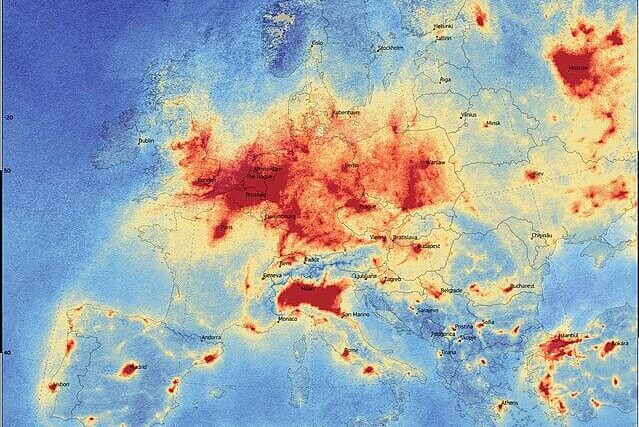
In 2021, over half a million lives were claimed by polluted air in the European Union (EU), according to estimates, with roughly 50% of these fatalities preventable by adhering to recommended pollution limits endorsed by medical professionals.
Research by the European Environment Agency (EEA) points to 253,000 premature deaths linked to elevated concentrations of fine particulate matter, or PM2.5, surpassing the World Health Organization’s (WHO) maximum guideline of 5µg/m3. An additional 52,000 deaths were attributed to excessive levels of nitrogen dioxide, while 22,000 resulted from short-term exposure to heightened ozone levels.
“The figures released today by the EEA remind us that air pollution is still the number one environmental health problem in the EU,” said Virginijus Sinkevičius, the EU’s environment commissioner.
Acknowledged by doctors as a leading global killer, air pollution’s death toll could diminish significantly if nations prioritise environmental cleanup. From 2005 to 2021, deaths from PM2.5 in the EU decreased by 41%, with a targeted reduction of 55% by the decade’s end.
While the WHO asserts that no level of air pollution is entirely safe, it has established upper limits for specific pollutants. Although the European Parliament aligned the EU’s air quality rules with the WHO’s guidelines in September, implementation was postponed until 2035.
“The good news is that clean air policy works, and our air quality is improving,” said Sinkevičius. “But we need to do better still, and bring pollution levels down further.”
For the first time, the EEA calculated the comprehensive health impact of air pollution, not just in terms of raw mortality but also by assessing the additional years lived with diseases induced by poor air quality. This analysis unveiled overlooked suffering associated with conditions like asthma, while for illnesses such as lung cancer and ischaemic heart disease, the impact remained relatively stable.
“When people get lung cancer, normally they die very quickly,” said Alberto González Ortiz, an EEA air pollution researcher. “For other diseases – especially asthma but also diabetes or also chronic obstructive pulmonary disease – there is also an important contribution of this state of living with disability.”
Chronic obstructive pulmonary disease, a consequence of PM2.5 pollution in 2021, was estimated by the EEA to have led to the loss of approximately 150,000 years of life and a comparable number of years with disability across the EU.
“People can live for a long period in a bad condition,” said González Ortiz. “Considering only mortality, we were underestimating the impact of air pollution.”
The primary sources of toxic gases and harmful particles include burning fossil fuels, vehicular emissions, and livestock farming. The smallest particles, PM2.5, can infiltrate the bloodstream, causing widespread damage to organs from the brain to reproductive organs.
An investigation by The Guardian revealed that 98% of Europeans were breathing air exceeding WHO guidelines for pollutants. The burden of disease, as indicated by EEA findings, is disproportionately concentrated in Eastern and Southeastern Europe. Addressing these challenges urgently is crucial to curbing the devastating impact of air pollution on public health.
Leena Ylä-Mononen, the executive director of the EEA, said: “The positive news is that authorities at European, national and local levels are taking action to reduce emissions through measures like promoting public transport or cycling in city centres, and through updated legislation.”
——————————————————————————
At Natural World Fund, we are passionate about stopping the decline in our wildlife.
The decline in our wildlife is shocking and frightening. Without much more support, many of the animals we know and love will continue in their decline towards extinction.
When you help to restore a patch of degraded land through rewilding to forests, meadows, or wetlands, you have a massive impact on the biodiversity at a local level. You give animals a home and food that they otherwise would not have had, and it has a positive snowball effect on the food chain.
We are convinced that this is much better for the UK than growing lots of fast-growing coniferous trees, solely to remove carbon, that don’t actually help our animals to thrive.
This is why we stand for restoring nature in the UK through responsible rewilding. For us, it is the right thing to do. Let’s do what’s right for nature!
Donate today at https://naturalworldfund.com/ and join in the solution!

